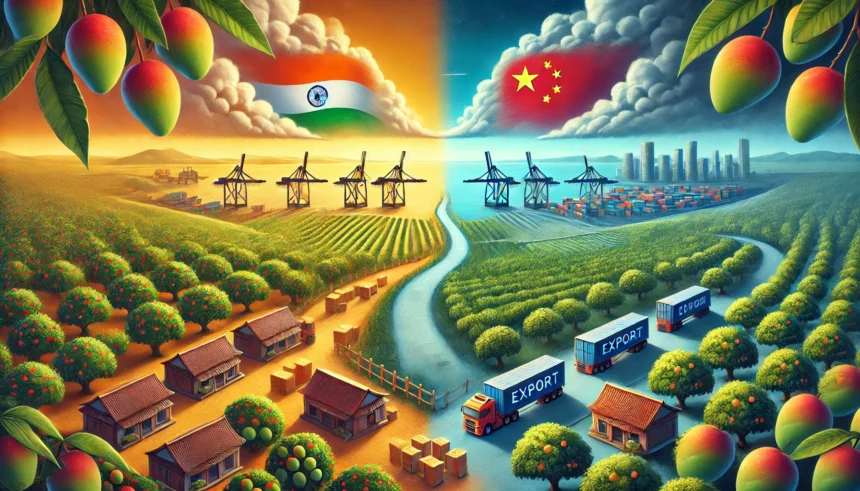India has long been renowned as the land of the “King of Fruits,” with its mangoes dominating both domestic and international markets. However, a recent development in global trade has raised alarms in India’s agricultural sector: China has begun exporting Indian mango varieties, and this is rapidly eating into India’s share of the global market. This article delves into the economic implications of this trend and explores how it is reshaping India’s agricultural landscape.
The Rise of China’s Mango Exports
In recent years, China has aggressively entered the global mango market, exporting varieties traditionally associated with India. In 2023 alone, China exported mangoes worth $59.43 million, with a significant portion of this comprising varieties like Alphonso and Kesar, which have their origins in India. This development is not just a matter of trade but also raises questions about intellectual property and the protection of indigenous agricultural products (mint).
Economic Impact on India
The impact on India’s mango export industry is profound. India’s export of mangoes has been a significant contributor to the agricultural economy, with the fruit being a major source of income for farmers, particularly in states like Maharashtra, Gujarat, and Uttar Pradesh. The influx of Chinese mangoes, often sold at competitive prices due to lower production costs, is undercutting Indian exporters and reducing their market share in key regions like the Middle East and Europe.
Moreover, the quality perception of Indian mangoes could suffer as Chinese-grown varieties enter the market, potentially confusing consumers and diluting the brand value that Indian mangoes have built over centuries. This could lead to long-term damage to India’s mango export industry.
Cultural and Agricultural Significance
Mangoes are more than just a fruit in India; they are a symbol of cultural heritage. The “Mango Wars” are not just about economics but also about protecting a legacy. Indian mangoes are often linked with cultural practices, religious ceremonies, and even literature. This cultural significance adds another layer to the importance of protecting the market share and ensuring that Indian mango varieties retain their identity on the global stage.
Potential Strategies for India
India faces a critical moment in safeguarding its agricultural treasures. Some potential strategies could include:
- Geographical Indication (GI) Tags: Strengthening the GI tags for Indian mango varieties could help protect them from being replicated elsewhere. This legal protection would ensure that only mangoes grown in specific regions of India can be marketed under certain names.
- Improving Export Quality: Focusing on enhancing the quality of mango exports through better agricultural practices, packaging, and certification could help Indian mangoes stand out in the global market.
- Exploring New Markets: India could diversify its export markets to regions less saturated by Chinese competition. Exploring untapped markets in Africa and Latin America might offer new opportunities.
- Bilateral Trade Negotiations: Engaging in trade negotiations with countries importing Chinese mangoes could help create a favorable environment for Indian mangoes, such as through reduced tariffs or exclusive trade agreements.
The Road Ahead
The “Mango Wars” symbolize a broader challenge that India faces in the global agricultural market. As countries like China continue to expand their reach, it becomes imperative for India to innovate and protect its agricultural exports. The stakes are not just economic but also cultural, making it essential for policymakers, farmers, and industry stakeholders to collaborate in defending India’s mango heritage.
By addressing these challenges head-on and implementing strategic solutions, India can not only safeguard its market share but also reinforce its position as the true home of the “King of Fruits.”

